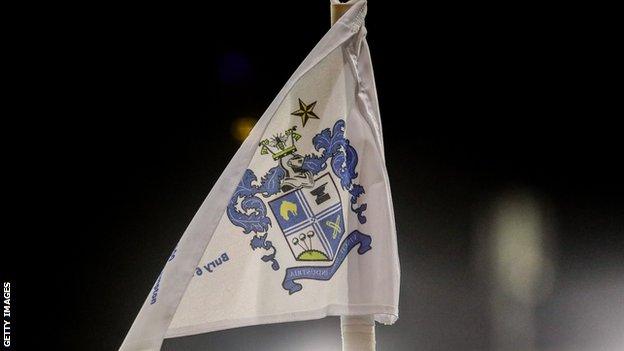Bury: Winding-up petition against League One club dismissed by High Court
- Published

Bury will start the season with a 12-point deduction after entering a company voluntary agreement
A winding-up petition issued against Bury over an unpaid tax bill has been dismissed by the High Court.
Creditors approved a company voluntary arrangement (CVA) on 18 July, which was proposed to help settle some of the League One club's debts.
Previously, the case had been adjourned three times before Wednesday's hearing.
Prior to their court appearance, Saturday's game at MK Dons was called off as the EFL said Bury failed to show evidence of their financial viability.
The court case was originally brought by former head coach Chris Brass and later taken over by HM Revenue & Customs.
An English Football League statement on Monday said the league was not satisfied it had received the necessary information that demonstrated how the club will be funded in future.
It is understood that the Shakers, who were deducted 12 points as a result of the CVA being approved, will be referred to an independent disciplinary panel.
In a statement, Bury chairman Steve Dale called on fans to unite and asked for the EFL to work with the club.
"We hope that our ongoing talks with the EFL will allow them to see what we are facing with saving our club and to please work with us," he said.
"They are now the only thing stopping Bury's survival and we implore them to help us."
What is a CVA?
An insolvent company can use a company voluntary arrangement to pay its creditors over a fixed period and, if they agree, the company can continue to trade.
The company needs to apply for its CVA through an insolvency practitioner who, within a month of their appointment, will work out an arrangement to cover how much of the debt it can pay, as well as a payment schedule.
The creditors will then be invited to vote on the arrangement, however, the proposal must be approved by creditors who are owed at least 75% of the debt.
If 75% of creditors cannot agree on the arrangement, the company could face voluntary liquidation.
However, Bury's CVA - which will see football creditors paid in full and unsecured creditors paid 25% of the money they are owed - was eventually approved.